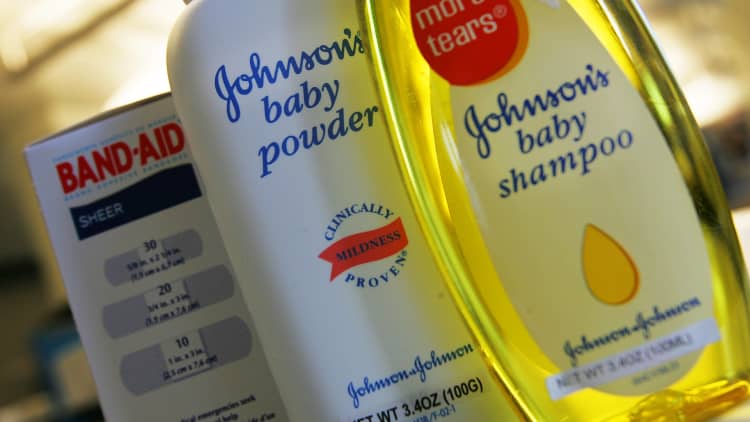
When Meg Conrad shops for baby products for her 3-month-old daughter, Elin, she always checks the label.
"I try to avoid products that have sulfates, parabens, phthalates and artificial fragrances," the 30-year-old Conrad said. "Everything you put on your skin gets absorbed into your bloodstream, so I want to protect my daughter from any harmful chemicals and toxins that could potentially be in products."
What won't you find in Conrad's bathroom? Johnson's Baby products. The 124-year-old iconic brand has contributed to a sales decline of 20 percent since 2011 in Johnson & Johnson's Baby Care unit, which includes Aveeno and other lines, to $1.9 billion last year. Sales in the first quarter of 2018 declined 14 percent in the U.S.
J&J says it's still the global leader in the category, but acknowledges it needs to make a change. So the company has redesigned the line to appeal more to moms like Conrad, with a plan to introduce it to stores in August.
"Perhaps because of our success, we became a bit complacent and did not want to mess with success, for lack of a better expression," Jorge Mesquita, worldwide chairman and executive vice president for J&J's $13 billion global consumer unit, said in an interview with CNBC. "Frankly, we failed to see evolving needs from millennial consumers, millennial moms, and we failed to evolve our model."
Conrad said she and other new parents care a lot about what's in their baby products.
"All of my friends who are having children are very focused on this, so I've actually gotten a lot of ideas from what my friends have used on their children and what's working for them," Conrad said.
Her brand of choice is Erbaviva, an organic line reportedly used by the Kardashians. Brands like Jessica Alba's Honest Co. are also gaining steam, according to market research provider Euromonitor International, with pledges that they're free from ingredients like phthalates and parabens.
J&J removed parabens, which are used as preservatives, from its baby line in 2015, and phthalates, often used to control a product's structure, in 2009, said Trisha Bonner, associate director of research & development at J&J Consumer.
But when J&J started the research for the line relaunch three years ago, it talked with thousands of moms, and discovered the brand needed to go further, she said.
"What we learned is that they were looking for fewer, simpler ingredients, more naturally derived ingredients in their products," Bonner said from J&J's labs in Skillman, New Jersey. "From that, we knew that we had to completely make a change to our brand."
So J&J is cutting the number of ingredients in the new Johnson's Baby line by half, eliminating dyes and sulfates and replacing ingredients like mineral oil with coconut oil, she said. J&J also changed the packaging to add pumps to many of its products to make them easier to use while holding a baby.
Baby wash products are also designed to leave less residue.
"Our newborn line is less slippery," Bonner said, "because babies are slippery, right?"
The packaging will be changed to make it easier to recycle, and contain instructions for how to do so, Bonner said. J&J will also share information online about the ingredients in fragrances. It will still use both synthetic and natural fragrances.
J&J said it's making the changes, not because of safety issues, but because that's what customers wanted, Bonner said.
The Food and Drug Administration says it doesn't have information showing that parabens in cosmetics have an effect on human health, but that it's continuing to review studies on their safety. On phthalates, the agency says the effect, if any, on human health isn't clear, but that an expert panel convened between 1998 and 2000 by the National Toxicology Program "concluded that reproductive risk from exposure to phthalates were minimal to negligible in most cases."
"We feel we have a responsibility to remove these ingredients even though they're safe," Bonner said.
The line relaunch comes after J&J has been hit with a slew of lawsuits claiming its talc baby powder products cause cancer. As part of the reboot, the company is introducing new baby powder products, containing cotton, in addition to continuing to sell its products that contain talc and cornstarch. Mesquita disputed the claims in the lawsuits.
"We are absolutely certain that science shows that our talcum product is safe, and we will defend our brand and defend our product," Mesquita said. "But we're always innovating, we're always trying to evolve and upgrade, so we're looking at a new version of baby powder that has got a combination of cotton and powder, which consumers are very excited about, and that will be added to our lineup."
Mesquita said he expects the reboot to improve profit margins because of a simplification of its supply chain. He declined to provide specific estimates.
"We're very convinced that this restage will get Johnson's Baby back to growth," he said.

